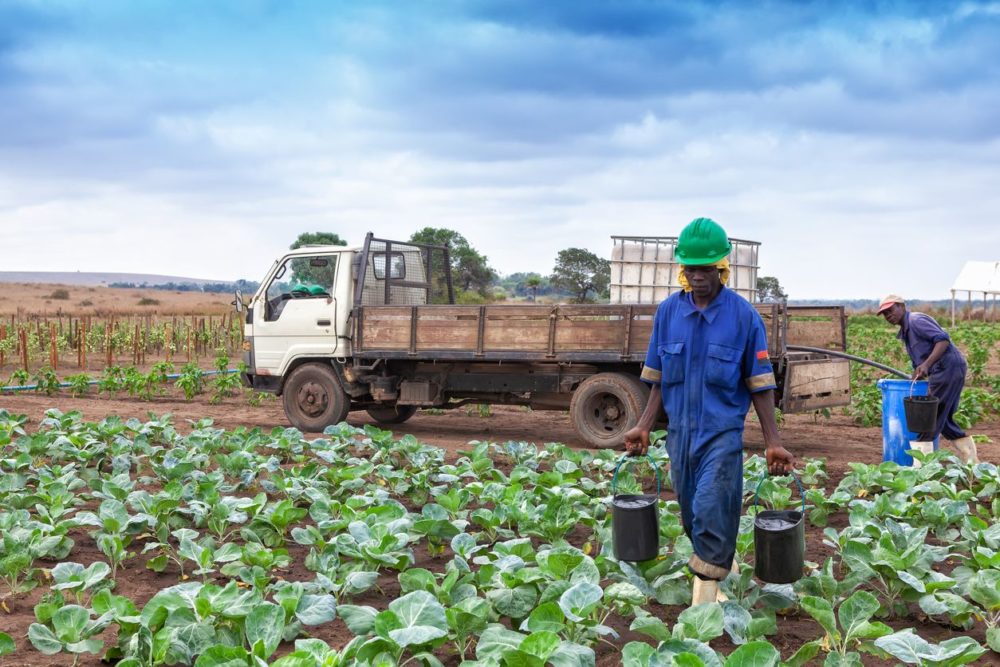This post has been published in partnership with FMO. The author is Maurice Scheepens, a senior investment officer with FMO’s Ventures Program who focuses on developing and implementing its agritech strategy.
There’s a $1 trillion market opportunity in Africa’s agriculture sector. Or there could be, if farmers, agri-processors, and other key players in the food value chain are enabled with the right technologies, resources, and capital between now and 2030.
There is also enormous social and environmental impact potential in the sector, which provides livelihoods for nearly 70% of the African workforce. In fact, building a stronger, more productive, and more resilient agriculture sector in Africa touches nearly all of the 17 UN Sustainable Development Goals.
As the Dutch entrepreneurial development bank, we at FMO have long understood the critical role of agriculture in the economic development, poverty alleviation, and food security of emerging markets, particularly African countries. We have supported the agriculture industry since our inception more than 50 years ago and increased our focus with the establishment of a dedicated Agri, Food & Water department in 2012. Our strategy for building capacity and driving investments in the sector is multi-faceted, and includes direct and indirect investments in agribusinesses, as well as technical assistance and ecosystem building efforts across the agri-value chain.
Our latest initiative is supporting AFN‘s launch of a dedicated Africa news channel, AFN Africa, to promote better information sharing and collaboration among Africa’s agrifood actors, and to crowd in more venture capital and private sector investment. We believe that improving the flow of information across Africa’s agrifoodtech industry supports the long-term growth of Africa’s agriculture sector.
Advancing African agrifoodtech
Africa’s persistent dependence on food imports and food insecurity stems from low levels of productivity from its farmers, most of which are smallholders cultivating only an acre or two of land. The continent needs more cost- and resource-efficient ways of producing and distributing food, for the sake of both its growing population and increasing vulnerability to climate change.
Many new promising innovations to secure and improve the world’s food supply are starting to gain traction globally. FMO believes that similar innovations in, and for, African markets could greatly improve economic livelihoods, food security, and climate resilience on the continent.
Through FMO’s Ventures Program and corresponding Technical Assistance Facility, funded by the European Commission and Dutch government, we support tech-enabled companies that help improve farmer yields and market access in emerging markets. In Africa, FMO has invested in South Africa-based Aerobotics, a company using satellite and drone imagery coupled with machine learning algorithms to help farmers monitor their crops and improve yields. We have also invested in the Kenya-based Acumen Resilient Agriculture Fund, which is investing in tech ventures supporting smallholder farmers’ livelihoods and climate resilience.
https://agfundernews.com/araf-acumen-resilient-agriculture-fund.html
FMO has also supported companies in other emerging markets. For example, we have invested in agri-marketplace DeHaat and food logistics venture WayCool in India – two companies that are improving farmers’ access to markets and inputs whilst reducing food wastage [AFN‘s parent company, AgFunder, is also an investor in DeHaat]. Similar solutions are emerging across Africa with goals of boosting farmers’ livelihoods, as well as strengthening the overall food supply chain for the benefit of consumers.
The role of news and information
Africa’s agrifoodtech ecosystem is at a considerably earlier stage of development than other regions. Of the roughly $30 billion in venture capital invested in new agrifood technologies in 2020, it is likely that only a few million dollars went to innovations in Africa. Investors appear reticent to back Africa’s agrifoodtech ventures because of their early-stage of development, long-standing perceptions of market risk, and general lack of information on market conditions and opportunities.
For such technologies to achieve meaningful scale and impact, they will require substantial early-stage and follow-on investments. Our support for AFN‘s dedicated Africa edition stems from our belief that better information sharing and collaboration among Africa’s agrifood actors, including entrepreneurs, investors, technical assistance providers, government agencies, and industry groups, supports the flow of capital to the sector and advances this important space on the continent.
AFN Africa will feature weekly investment news stories, startup and investor profiles, feature articles, data analyses, and guest contributions covering all aspects of Africa’s agrifoodtech scene. Early reporting from its team of local and global journalists spotlights companies like VeggieVictory in Nigeria, which is among the first plant-based protein startups to raise venture capital on the continent, and Pula in Kenya, which is improving farmers’ resilience through affordable crop protection insurance.
In partnership with FMO, AFN‘s parent company, AgFunder, will also produce its first Africa-focused investment report, analyzing the flow of venture funding to startups on the continent and deep-diving into specific sector and geographic trends.
We truly believe that technology will be a driver for positive change and long-term sustainable development. However, accelerating the development and adoption of technology requires more than investing in it: it requires ecosystem-level support. Research and media coverage are important components to establishing Africa’s agrifoodtech market and achieving broad-scale, sustainable impact.
For more information, read our press release about the partnership.




